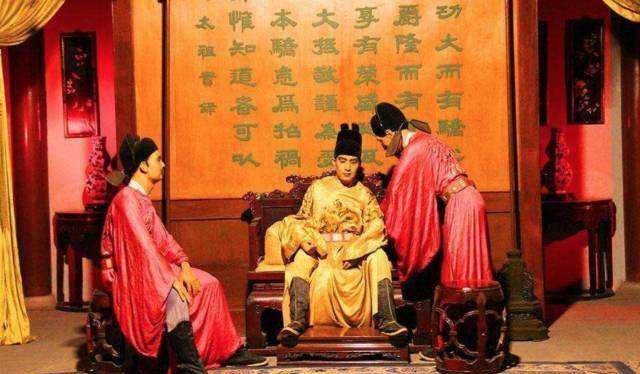
Ming Taizu Zhu Yuanzhang is the founding emperor of the Ming Dynasty, the emperor's life can be described as a legend, starting from the cloth, the most depressed time, but also to beg for a living, is such a person, after participating in the anti-Yuan, only lasted 15 years, is to establish a great Ming Dynasty, and achieved the success of the first Northern Expedition in Chinese history, such an act, throughout the dynasties of the founding emperors, is also one of the best.
After the founding of the Ming Dynasty, ming taizu Zhu Yuanzhang also went to great lengths to centralize power, such as killing Hu Weiyong in the thirteenth year of Hongwu, and was shunshi to dismiss Zhongshu Province, abolishing the system of chancellorship that had lasted for more than 1,000 years, and the emperor directly commanded the six ministries, which can be said to be a combination of imperial power and power, such an act was unimaginable in previous dynasties.
However, the Ming Emperor Zhu Yuanzhang's hard-working centralization of power was different in later generations, since the Ming Dynasty Emperor Zhu Di formally set up a cabinet, with the passage of time, the cabinet power of the Ming Dynasty was getting bigger and bigger, and later there was a cabinet first assistant, and it was also called Xiang.
From this point of view, Zhu Yuanzhang worked hard to centralize power, and the future generations seem to be the son of a loser, dividing power with the cabinet.
In fact, why the later emperors gave the cabinet more and more power was also a last resort, because not every emperor was as energetic as Zhu Yuanzhang, not every emperor had the patience of Zhu Yuanzhang, so he could not bear such a large workload, and could only use the cabinet to assist himself, and the corresponding certainty was to transition part of the power out.
Of course, seriously speaking, the future emperors, like Zhu Yuanzhang, the Ming Emperor, seem to have set up a cabinet to decentralize power, but they are also centralizing power, but in different ways. Ming Taizu Zhu Yuanzhang's domineering way is to directly do the work of the chancellor, and the later emperor is to distribute the power of the chancellor to a part of the cabinet, and then to the eunuch force in the part of the ceremonial supervisor, so although the cabinet chief assistant is called the xiang, but the eunuch of the ceremonial supervisor, also known as the internal minister by some people, such a setting, so that it is mutually contained, the emperor will not be left with power, but also let them help handle most of the government affairs.
And the later formation of the supervisor (Si Li supervisor), cabinet (cabinet) to jointly manage the state's government this way of centralizing power is very good, like the last emperor Chongzhen Emperor Zhu Youjian, unlike most of the kings of other dynasties, the Ming Dynasty's king of the country still has real power, it can be said that this design is effective to prevent the Ming Emperor's power from falling.
So how big is the workload of Ming Taizu Zhu Yuanzhang in a day? So much so that later emperors took another approach to avoid this workload?
According to the "Records of Ming Taizu", some people have deliberately counted that from September 14 to 21, 17 years of Hongwu, there were 1660 pieces of various departments in 8 days, which involved 3291 government affairs, on average, Ming Taizu Zhu Yuanzhang had to approve as many as 207 official documents every day, and handled more than 411 government affairs, which can be said to be a considerable workload. Like handling more than 411 things in government affairs, it is not that it is not possible to approve a line or not, but also to think about how to solve it, and then give instructions on what to do below, dealing with so many things a day, the average person really can't do it.
The huge workload can be described as a great burden for Zhu Yuanzhang, but in order to centralize power, he can only grit his teeth and persevere. Moreover, in order to prevent future emperors from suffering this kind of suffering and restore the status of chancellor, Zhu Yuanzhang also specifically said in the twenty-eighth year of Hongwu: "Abolish the chancellor, set up a government, a ministry, and a capital to separate the government, and the power of affairs belongs to the imperial court." The heir is not allowed to restore the chancellor, and the subordinates dare to place the requesters in a serious manner."
Zhu Yuanzhang left such ancestral instructions, and later emperors could only helplessly assume the position of emperor and chancellor. But the rules are dead, people are alive, so the development of later generations, these emperors ingeniously set up a cabinet and the celebrant to restrain each other, and at the same time can jointly assist the emperor in handling most of the government affairs, so that the emperor not only maintains centralized power, is not afraid of power, but also can hide in the harem lazy.
Thank you for watching Song Anzhi's exclusive original article, focusing on the history of the Ming and Qing dynasties and its great history of China, like to talk about those immutable histories from a different perspective, I think friends can remember to like and pay attention to Ha.